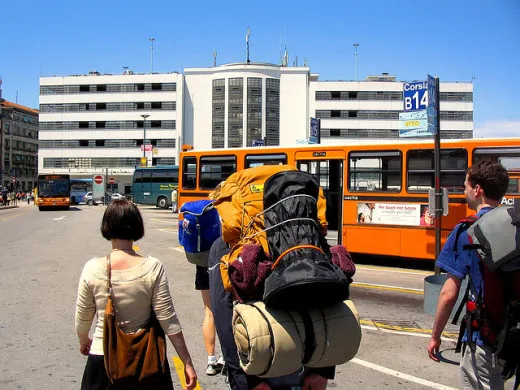Table of Contents
Getting lost. Disagreeing on which route to tackle next. Pushing through and continuing on even though you’re completely exhausted. When I took a trip to Barcelona a few weekends ago with friends, I realized that those traveling together share common moments of tension as do groups out in the wilderness. Although outdoor education programs are devoted to researching and improving group dynamics outdoors, their ideas are surprisingly useful to urban travelers.
Here are two tips from outdoor education programs that can help budding travelers lead successful expeditions:
1. Identify and agree upon common goals before setting out on your adventure.
The National Outdoor Leadership School teaches individuals how to successfully lead outdoor expeditions. The tips they offer for building a cohesive, cooperative, and successful group dynamic fall under the umbrella term “Expedition Behavior.” Expedition behavior means smiling through a dinner shift in the pouring rain and slowing down the pace for someone who is struggling, even if it means you hike a much longer day.
John Goodkin, Curriculum and Research Manager at NOLS, emphasizes one aspect of good expedition behavior in particular: supporting group goals. In his article “NOLS Expedition Behavior: From Conception to Mantra,” Gookin places contributing to “the mission and goals of the group” at the top of a long list of other points.
All adventures have a purpose, urban and rural. Even if we are unaware of our goals when we set out or if these goals turn out to be individual rather than shared, starting the discussion helps by clarifying expectations and forming a reference point for future moments of indecision.
Differences within a group of travelers can be a wonderful thing, but differences that extend to lifestyle and habitudes can ruin a trip if not communicated beforehand. That hour-long argument over what to do after dinner, for example, could dampen an otherwise fantastic night out. Some people like to get their sleep, while others prefer to dance the night away.
Tell each other these things before you leave, and come up with some common goals. Smaller goals are a way to highlight shared interests: to spend one afternoon picnicking in Park Güell or waking up early to hit the Sunday fruit market at its busiest. Expressing and agreeing upon a tangible purpose will often kick-start your adventure.
2. Take care of your own needs first.
Unfortunately, no matter how solid your group goals are, needing to use the restroom throughout an hour long tour will ruin your experience of the Sagrada Familia. It makes no difference how beautiful or exotic your travel destination is or how well (or poorly) you speak the local language. Taking care of yourself first is sometimes more difficult to accomplish than planning ahead for a trip.
Looking after your own needs in an urban setting is like watching out for blisters on a hike through the woods. The key is prevention.
Tod Schimelpfenig, co-author of the National Outdoor Leadership School’s book on Wilderness Medicine, addresses blisters as “a leadership challenge before they are a medical problem.”
He writes, “Blisters don’t happen without warning. As soon as you feel irritation or pain, stop. We’ve all probably used the excuse that we didn’t want to delay the group…Unfortunately by the time we stop, the hot spot may be a blister, and a small problem has become a challenge to manage. It’s good expedition behavior to speak up and ask for time to care for your feet.”
Small, personal problems can grow into group problems if unaddressed. For example, if you notice you’re running low on cash, tell your friends to keep an eye out for the next ATM rather than waiting until you split the bill at dinner and have to ask someone else to cover.
Good expedition behavior holds for urban settings as well. Be aware of how you’re doing and speak up when you need something.
With those two tips in mind, it’s time to go exploring!





